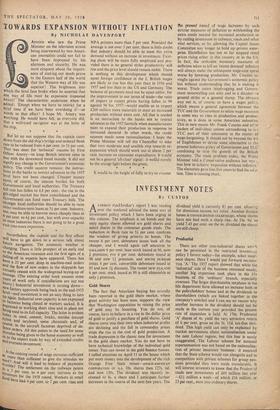TOWARDS EXPANSION WITHOUT INFLATION
By NICHOLAS
DAVENPORT But let no one suppose that the captain came down from the old ship's bridge and ordered Bank rate to be reduced from 6 per cent. to 51 per cent. That was done for 'technical' reasons by First Officer Amory—to keep British interest rates in line with the downward trend outside. It did not signify any change in the Government's economic policy. The credit squeeze remains; the instruc- tions to the banks to restrict advances to the 1957 level have not been changed. Cheaper money eases, of course, the interest burden for both Government and local authorities. The Treasury bill rate has fallen to 4.8 per cent.; the rise in the gilt-edged market has been consolidated and the Government can fund more Treasury bills. The stronger local authorities should be able to raise more medium-term loans at 54 per cent. Industry, too, may be able to borrow more cheaply than at 6 per cent. to 61 per cent., but with over-capacity, in most industries there is not going to be a great rush into more expansion.
Nevertheless, the captain and the first officer Will have to get down to a serious talk about future navigation. The economic weather is Changing. There is little prospect of an early end to the American recession and the first signs of a falling-off in exports have appeared. There has been a 25 per cent. drop in machine-tool orders and the flow of new orders in the shipyards has virtually ceased with the widespread laying-up of tonnage. (The existing order book ensures some Years of work only if cancellations are not too heavy,) Industrial investment is turning down— ,new, factory approvals being back to the end-1953 level—and investment is not an easy thing to turn P again. Industrial over-capacity is not expressed In factories being closed or workers sacked. It is expressed in working short time and in plant not ring used to its full capacity. The latter is evident nylon in steel, cement, bricks, textiles (except o and terylene), some chemicals and, of eourse, in the aircraft factories deprived of de- fence orders. All this points to the need for some stimulus being given to the home economy as well as to the export trade by way of extended credits and overseas investment.
Is the coming round of wage increases sufficient or more than sufficient to give the stimulus we ed. And will it lead to balance of payments trouble? The settlement on the railways points
3 per cent. to 4 per cent. increase as the
food for the 1958 round. Workers in retail auod have had 4 per cent. to 7 per cent. rises and NPA printers more than 5 per cent. Provided the average is not over 5 per cent, there is little doubt that industry should be able to meet this extra demand without an increase in investment. Exist- ing plant will be more fully employed and pro- vided there is no general strike productivity will rise and the price level should remain stable. There is nothing in this development which should upset foreign confidence in the £. British wages are likely to rise less this year than in 1956 and 1957 and less than in the US and Germany. The balance of payments need not be upset either, for the improvement in our terms of trade—the ratio of import to export prices having fallen to 90 against 96 for 1957—would enable us to import £260 million more materials to meet an increased production without extra cost. All that is needed is an instruction to the banks not to restrict advances to the 1957 formula when manufacturers want to expand their production in response to increased demand. In other words, the credit squeeze needs some rationalisation. I hope the Prime Minister will tell the Chancellor to take that very moderate and sensible step towards re- expansion which should work out at about 2 per cent. increase on consumer expenditures. It would not be a general 'all-clear' signal : it world merely be the orange light before the green.
• It would be the height of folly to try to counter
the present round of wage increases by such stricter measures of deflation as withholding the extra credit needed for increased production or by cutting investment in railways, roads and other vital services, or by allowing the Capital Issues Committee any longer to hold up private enter- prise. Disinflation has not so far stopped retail prices rising either in this country or in the US. In fact, the orthodox monetary measures of deflation taken to kill an 'excess demand' inflation will always make the subsequent wage-cost spiral worse by lowering production. Mr. Cousins in- veighs against the Government's economic policy but without understanding that he is making it worse. Trade union leapfrogging and Govern- ment stonewalling can only end in a disaster—a general strike or a general slump. The obvious way out is, of course. to have a wages policy, which means a general agreement between the TUC and the Government to relate wage increases in some way to rises in production and produc- tivity, as is done in some American industries. This in turn means Mr. Frank Cousins and other leaders of individual unions surrendering to tit: TUC part of their autonomy in the matter of wage-bargaining. It should not be beyond the wit of Englishmen to devise some alternative to the present ludicrous policy of Government and TUC combining to stop the growth of the British economy. The main problem today, the Prime Minister told a Conservative audience last wee was how to achieve 'expansion without inflation.' The electorate gave him five years to find the solu- tion. Time is running short.












































 Previous page
Previous page